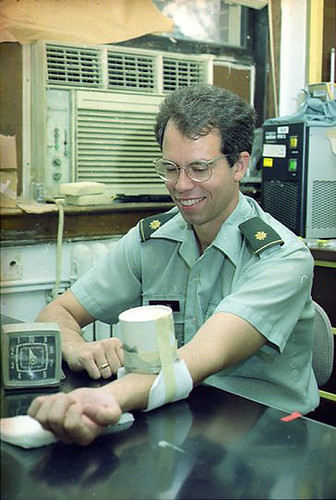Brave Scientists Risk Own Lives to Find a Cure for Malaria
A vaccine, developed by the PATH’s Malaria Vaccine Initiative in partnership with GlaxoSmithKline, providing approximately 50% efficacy against malaria, is the result of 25 years of research, and the bravery of scientists willing to infect themselves with the disease in order to test the vaccine.

Dr. Ripley Ballou, Army researcher
infecting himself with malaria
to save others lives
Picture from One Campaign via Flickr.
A vaccine, developed by the PATH’s Malaria Vaccine Initiative in partnership with GlaxoSmithKline, providing approximately 50% efficacy against malaria, is the result of 25 years of research, and the bravery of scientists willing to infect themselves with the disease in order to test the vaccine.
Malaria, which can be cured by anti-malarial drugs, is now mutating into a drug-resistant version along the Thai-Cambodia border due in part to the influx of substandard and counterfeit anti-malarial medications sold to the poor. The counterfeit medications contain small quantities of active ingredients, notably artemisinin, which is the most recently developed and effective anti-malarial agent. Exposure to low, non-therapeutic doses of the medication have given the disease resistance to the medication, scientists at the World Health Organization suspect. A vaccine would put the counterfeiters out of their lucrative and deadly business, saving millions of childrens’ lives.
Dr. Ripley Ballou, head of clinical research and translational science at GlaxoSmithKline Biologicals was an Army major leading an experimental study of the first malaria vaccine candidate in 1987. The potential vaccine developed by Walter Reed Army Institute of Research, the National Institutes of Health and GSK, was the first iteration of the vaccine now expected to start saving lives in 2015, reports NGO One.
As part of their research, besides interviewing devastated mothers who lost their children to malaria, they also inflicted themselves with both the test vaccination, and the disease.
Said Dr. Ballou, “There was a tradition in our institution that before giving a new vaccine to strangers, you were to test it on yourself.”
He and his fellow researchers from Walter Reed injected themselves with the vaccination, and then a few weeks later, subjected themselves to bites from five mosquitoes heavily infected with falciparum malaria. The results were impressive. One person was completely protected, but no one else, even Dr. Ballou. But they knew then that they could create a vaccination for malaria, something upon which Dr. Ballou has been concentrating for 25 years.
Ten years later, another researcher, Joe Cohen, discovered a potential vaccine that protected six of seven volunteers.
In the almost 15 years since, PATH Malaria Vaccine Initiative and a number of African researchers have been leading trials, including in the location where Dr. Ballou first encountered the suffering of malaria, through loss of life and his own illness.
Dr. Ballou is committed to defeating malaria, and believes that in the next few years a true malaria vaccine will be available.